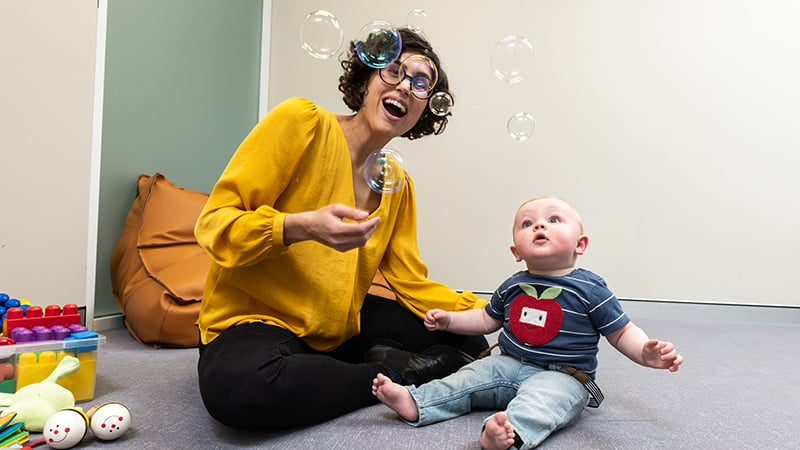
A child-led therapy that supports the social development of babies showing early signs of autism has found a significant reduction in social communication difficulties in babies who received the therapy, according to new research led by CliniKids at The Kids Research Institute Australia.
In a study published in JAMA Pediatrics, an international research team led by Professor Andrew Whitehouse (Angela Wright Bennett Professor of Autism Research at The Kids and The University of Western Australia and Director of CliniKids) found that babies who received iBASIS-VIPP therapy experienced less disability (eg. language difficulties) compared to those who received treatment as usual. It also helped parents connect with their babies.
Professor Whitehouse said many therapies for autism tried to replace developmental differences with more ‘typical’ behaviours. In contrast, iBASIS-VIPP sought to work with each child’s unique differences and create a social environment around the child that would help them learn in a way that was best for them.
“The therapy uses video-feedback to help parents understand and appreciate the unique abilities of their baby, and to use these strengths as a foundation for future development,” Professor Whitehouse said.
“By doing so, this therapy was able to support their later social engagement. We also found increased parental sensitivity to their baby’s unique communication and an increase in parent-reported language development. Other general aspects of development were not affected.
“The children still had developmental difficulties, but by working with each child’s unique differences, rather than trying to counter them, the therapy has effectively supported their development through the early childhood years.”
The four-year randomised clinical trial enrolled babies aged 9-14 months to investigate the impacts of iBASIS-VIPP. All babies had shown early behavioural signs of autism. Over a period of five months, half received the video intervention, while a control group received current best practice treatment.
Eighty-nine children completed an assessment at the start of the study, at the end of the therapy period, and when they were two and three years of age. Identification, assessments and interventions took place in Perth as a collaboration between The Kids and the Child Development Service, which is part of the Child and Adolescent Health Service, and in Melbourne at La Trobe University, led by Associate Professor Kristelle Hudry.
Professor Whitehouse said given the high prevalence of autism worldwide, the implications of the findings were enormous. In Australia, about 2 per cent of all children have an autism diagnosis.
“Autism is not typically diagnosed until three years of age, however, interventions commencing during the first two years of life, when the first signs of development difference are observed and the brain is rapidly developing, may lead to even greater impact on developmental outcomes in later childhood,” Professor Whitehouse said.
“This is a genuine landmark moment for child health research. Our aim is to understand each child’s strengths and challenges so that we can better support and nurture the unique abilities they bring to this world.
“This is an important step forward in what we hope is an opportunity to develop new clinical models that use very early intervention in babies showing early behavioural signs of autism.”
Professor Whitehouse said follow-up of study participants in later childhood, when the behaviours for autism may be more apparent, would be critical to determining the longer-term significance of the video intervention.
The study was funded by the WA Children’s Research Fund, the Cooperative Research Centre for Living with Autism (Autism CRC – established and supported under the Australian Government's Cooperative Research Centre Program), La Trobe University’s Understanding Disease Research Focus Area, and the Angela Wright Bennett Foundation.
Collaborating institutions included La Trobe University, The University of Western Australia, the Western Australian Child and Adolescent Health Service, Griffith University, the University of South Australia, the University of Manchester UK, and Evelina London Children's Hospital, part of Guys and St Thomas’ NHS Foundation Trust UK.
The full paper, Effect of pre-emptive intervention on developmental outcomes for infants showing early signs of autism: A randomized clinical trial of outcomes to diagnosis can be read here.
